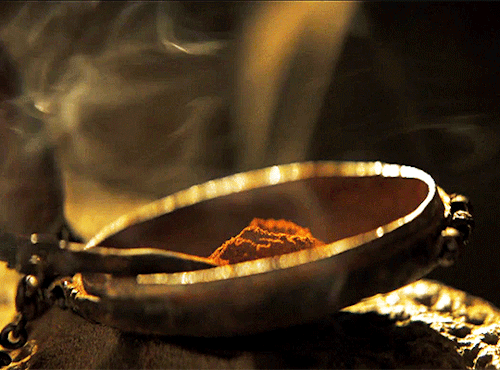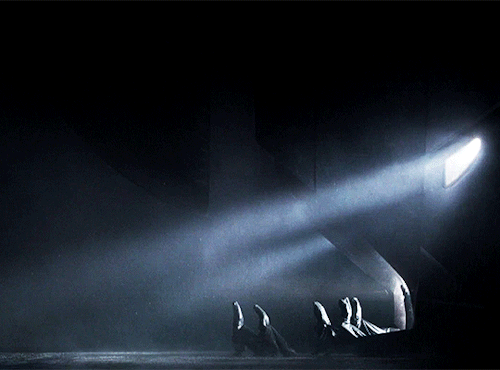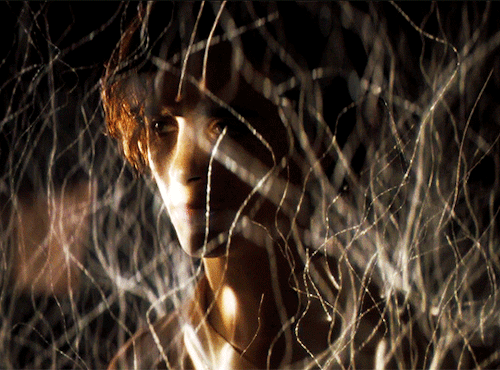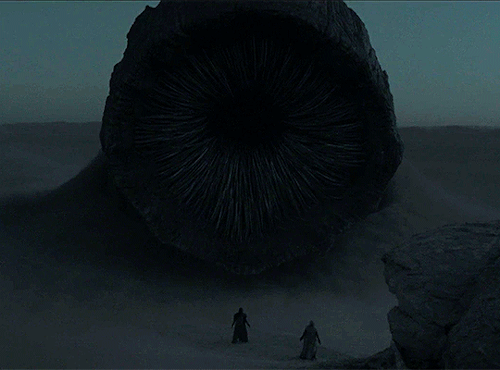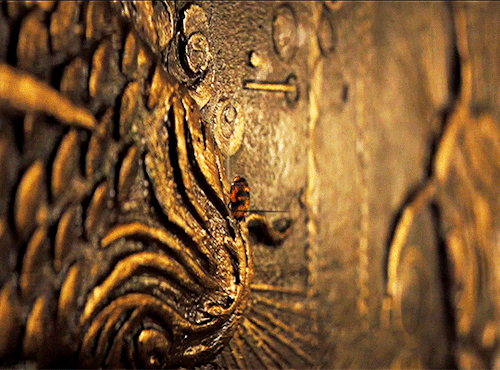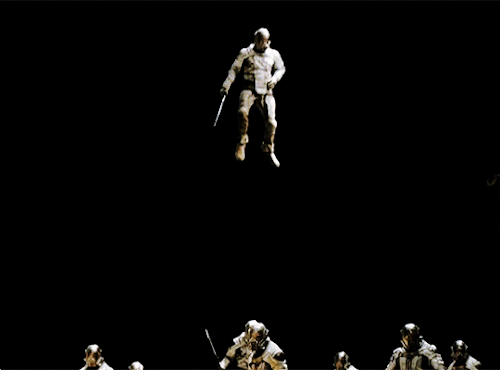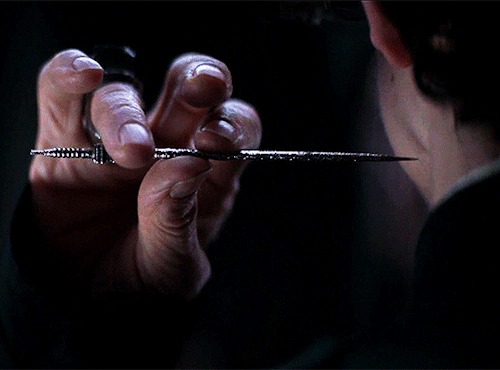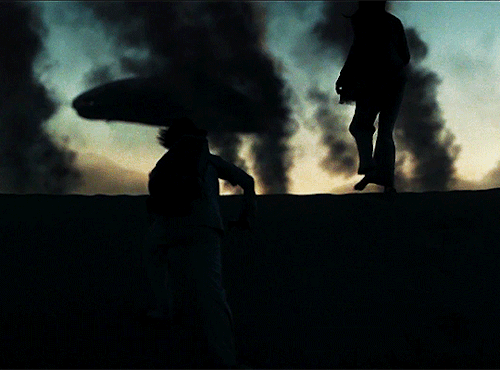Tea Cups And Home Decor For Denis Villeneuve’s Dune. Via IG: Keramiart




Tea cups and home decor for Denis Villeneuve’s Dune. Via IG: keramiart
More Posts from Mariefenring and Others
regarding Dune Part 2: i am obsessed with its consistent visual theme of self-destruction. the shot of paul surrounded by his new followers seems triumphant - until the viewer remembers that each crysknife is made from a tooth of shai-hulud, and paul is standing in a circle of them, in the allegorical mouth of the worm. he orders a missile strike, and the viewer sees them fly directly through his head. every victory for the prophecy is a blow to paul himself; he's killing himself with every step he takes towards his destiny, and we know that already, and the film is screaming it, but it's a hell of a thing to watch it happen, isn't it?..

A Bene Gesserit and an assassin.
( AU!Marie Fenring )
.
.
.
.
follow on insta: serenlas
I'm rereading Dune in honour of the movie, and I had genuinely forgotten how absolutely vicious Leto's wit can be. Two examples:
Halleck stirred, said: "I think what rankles, Sire, is that we've had no volunteers from the other Great Houses. They address you as "Leto the Just" and promise eternal friendship, but only as long as it doesn't cost them anything."
"They don't yet know who's going to win this exchange," the Duke said. "Most of the Houses have grown fat by taking few risks. One cannot truly blame them for this; one can only despise them."
Pretty sure some of the heads of other houses just woke up several planetary systems away in a cold sweat, with the vague feeling of just having been verbally flayed.
"This is a carryall," Hawat said. "It's essentially a large 'thopter, whose sole function is to deliver a factory to spice-rich sands, then to rescue the factory when a sand-worm appears. They always appear. Harvesting the spice is a process of getting in and getting out with as much as possible."
"Admirably suited to Harkonnen morality," the Duke said.
I think the Baron is beyond feeling someone else roasting him from a system away, as it happens far too often, but still.
Finally, a gentler example:
"Gurney, take care of that smuggler situation first."
" 'I shall go unto the rebellious that dwell in the dry land,' " Halleck intoned.
"Someday I'll catch that man without a quotation and he'll look undressed," the Duke said.
I wish we'd had time to see this in the movie, because even though a fair amount of this is him putting on a bit of a show for his men, it's still hilarious.
A Dune thought I was having recently is about when Leto II bonds with the sandtrout in Children of Dune. I was thinking about the role of the sandtrout in the sandworm's lifecycle, as larva, but how it cordons off water so the worm can flourish. When the sandtrout bonds to Leto II, it's like it would cordon off the water in his body so it can begin to flourish.
So he's watered and unwatered, human and sandworm, male and female, ancient and of the future, merciful and notoriously without mercy, Tyrant and redeemer... and like where the Fremen take the dead to sap their water, he's a living deathstill. It's good, it's very good.






My father came, not for spice, not for the riches, but for the strength of your people. My road leads into the desert. I can see it. If you’ll have us, we will come. DUNE (2021) dir. Denis Villeneuve
Animatic of the opening scene from Jodorowsky's Dune (unmade)
Art: Moebius Directed: Alejandro Jodorowsky Year: mid 1970s As seen in 'Jodorowsky's Dune' (2013)
As the release of DUNE looms, I find myself thinking deep thoughts about the story again. When people who haven't read it ask me about it, I usually say something along the lines of, "It's an extremely important work in the sci-fi genre, on the level of Lord of the Rings for fantasy, amazing worldbuilding, but it's very dry and the author was a white man in the sixties." Well, it occurs to me that "white man in the sixties" can mean a lot of things, so let's talk more about what it means for Dune!
I see two common criticisms leveled at Dune. The charge of biological essentialism, and the charge of it being a white savior narrative. It is not a white savior narrative, and I'll explain why below. The charge of biological essentialism is accurate, and I'll go into that more as well.
Without getting too spoiler-heavy, the plot of Dune is that Paul Atreides, heir to Duke Leto Atreides, moves to the planet Arrakis when the Emperor awards the planet to House Atreides in fief complete. Basically, the universe in Dune is space feudalism, and House Atreides is one of many noble houses engaged in feudal government. When Paul shows up, the local, oppressed populace, the Fremen, think he's a foretold, prophesied "chosen one," here to lead them out of bondage. Then House Atreides gets betrayed and mostly destroyed, Paul goes into hiding with the locals, and eventually uses them to overthrow his enemies and take back the planet, as well as leveraging the planet's strategic importance and his control of it to place himself on the Emperor's throne.
So, on the surface, definitely white savior stuff. But even a slightly deeper reading, an analysis designed to actually interrogate the text and not just generate a pithy headline to garner outraged clicks, will tell us that this isn't accurate. For one, Paul is a chosen one, but he's not the Fremen's. He is the product of a millennia-long scheme by a shadowy cabal of mystics called the Bene Gesserit to breed a superhuman. We'll get into this more in the biological essentialism bit, but the Bene Gesserit have infiltrated all walks of life throughout the future. They have a branch called the Missionaria Protectiva, which sends operatives to primitive worlds in the guise of religious prophets and has them plant broadly-worded, easily exploitable prophecies and beliefs in local populations. Then, later, if another Bene Gesserit operative shows up and needs, say, an army of religious fanatics, they say the right words and present someone who fits the broad criteria and boom, you have a chosen one.
This is exactly what happens in the book. Paul's mother Jessica is a Bene Gesserit member, and when they go into hiding, she exploits the fact that a Manipulator of Religions has been on Arrakis to maneuver Paul into position as the Fremen's chosen one. Paul himself is trying to resist embracing the mantle, because he knows that if he leans fully into it the Fremen will go on a wild crusade across the universe and burn everything down in his name. At the end of the novel, he realizes that the jihad is inevitable, that there was no way at all to stop it - even if he had killed himself, he would have become a holy martyr. A certain Fremen character, dying out in the desert, hallucinates his father, who tells him, "No more terrible disaster could befall your people than for them to fall into the hands of a Hero." This is Herbert telling us on the page, in a scene that matters very little to the overall plot, that Paul's very presence on this planet, his status as the Fremen savior, is a terrible tragedy. We are supposed to sympathize with Paul because all of his enemies are categorically worse than he is, but this is not a book about Good People Doing Good Things. Paul is an oppressor, a feudal duke, a tyrant. His story is a *warning.*
Now, where the book gets very sticky: the biological essentialism. I'll quote the OED here: "The belief that ‘human nature’, an individual's personality, or some specific quality (such as intelligence, creativity, homosexuality, masculinity, femininity, or a male propensity to aggression) is an innate and natural ‘essence’ (rather than a product of circumstances, upbringing, and culture)."
In Dune, men and women are biologically distinct on a fundamental, universal level. The aforementioned Bene Gesserit are an order of women. Using the spice (which must flow), they can look backward in their body's genetic memory along matrilineal lines, becoming essentially gestalt consciousnesses of thousands of people. One of their order's chief goals is to create the Kwisatz Haderach, a man who can look back in his body's memory in the same way, but can do so along both male and female lines. There is a scene in the book where Paul explains it - to summarize, in everyone there is a place that takes and a place that gives. Women can look into the giving place, but are terrified of the taking place. Paul, once he has reached apotheosis as the Kwisastz Haderach, can look into both places.
There's a lot of other hoo-hah about men and women having different dispositions - Duke Leto at one point asks Jessica how she can so easily set aside her concerns and distractions, and she says "It's a female thing." When Jessica becomes a Reverend Mother, looking back into her body's memory, she's pregnant with her daughter Alia. Alia also becomes a Reverend Mother in the same instant, before she's even born, and it's made explicit that if she had been a male embryo (because she is less than two months gestated at this point!) she would have died.
This is what people are talking about when they say that an author's world view shapes their work. Herbert was writing in the sixties. Biological sex and gender were not understood to be separate concepts. The Nazis had destroyed the vast majority of all scholarly research into transgender people, since most of it had been done at a university in Germany. Homosexuality was still illegal (reflected in the book's main antagonist, Baron Harkonnen, who is a homosexual pedophile, and in 'effeminacy' being a damning trait in male characters in the book). I'm not saying these things to excuse the fact that he wasn't progressive in his views. I'm saying this because his views and understanding of the world around him literally shape the laws of his universe. In Herbert's mind, men and women were fundamentally distinct, and so in the universe of Dune, they are.
I'm interested in seeing how the film addresses these issues - whether it chooses to just kind of ignore them and hope we don't notice, or if it's going to try to update these archaic notions for modern sensibilities. Dune is a seminal piece of worldbuilding - Herbert's realization of this universe, its eddies and flows of power, the way the entire society is structured around the consumption of spice, the understanding he demonstrated of the feudal system in his translation of it to a far-flung future, and indeed, I maintain, Herbert's multi-layered criticism of the white savior trope - it's all undermined by the fact that the structure of the world itself reflects unfortunate, backward, biological essentialist thinking that we as modern people can no longer engage in.
Anyway that was a very long ramble. If you actually read all this, you're a beautiful, patient soul. :v
-
 nikita-chiquita reblogged this · 9 months ago
nikita-chiquita reblogged this · 9 months ago -
 nikita-chiquita liked this · 9 months ago
nikita-chiquita liked this · 9 months ago -
 mariefenring reblogged this · 9 months ago
mariefenring reblogged this · 9 months ago -
 ironmanfundibiela liked this · 1 year ago
ironmanfundibiela liked this · 1 year ago -
 ujhy996tkudfoutdgfy9iggghoi liked this · 1 year ago
ujhy996tkudfoutdgfy9iggghoi liked this · 1 year ago -
 dsitara-blog liked this · 1 year ago
dsitara-blog liked this · 1 year ago -
 nightbloominglotus reblogged this · 1 year ago
nightbloominglotus reblogged this · 1 year ago -
 pozhar reblogged this · 2 years ago
pozhar reblogged this · 2 years ago -
 sunhanded reblogged this · 3 years ago
sunhanded reblogged this · 3 years ago -
 alice-anon liked this · 3 years ago
alice-anon liked this · 3 years ago -
 aguacatito reblogged this · 3 years ago
aguacatito reblogged this · 3 years ago -
 forestvoice reblogged this · 3 years ago
forestvoice reblogged this · 3 years ago -
 amymone13 liked this · 3 years ago
amymone13 liked this · 3 years ago -
 slothgoth reblogged this · 3 years ago
slothgoth reblogged this · 3 years ago -
 honoraryastronaut reblogged this · 3 years ago
honoraryastronaut reblogged this · 3 years ago -
 berscrk liked this · 3 years ago
berscrk liked this · 3 years ago -
 elithewho reblogged this · 3 years ago
elithewho reblogged this · 3 years ago -
 aroacethomasthorne liked this · 3 years ago
aroacethomasthorne liked this · 3 years ago -
 akahypotheticals reblogged this · 3 years ago
akahypotheticals reblogged this · 3 years ago -
 thefightingurukhai reblogged this · 3 years ago
thefightingurukhai reblogged this · 3 years ago -
 thefightingurukhai liked this · 3 years ago
thefightingurukhai liked this · 3 years ago -
 softgirls-world liked this · 3 years ago
softgirls-world liked this · 3 years ago -
 chrisendom reblogged this · 3 years ago
chrisendom reblogged this · 3 years ago -
 slowdancinginhell liked this · 3 years ago
slowdancinginhell liked this · 3 years ago -
 germanicusgirl liked this · 3 years ago
germanicusgirl liked this · 3 years ago -
 amelodie reblogged this · 3 years ago
amelodie reblogged this · 3 years ago -
 cassyphace liked this · 3 years ago
cassyphace liked this · 3 years ago -
 thewinterstag liked this · 3 years ago
thewinterstag liked this · 3 years ago -
 jamiemcdnlds liked this · 3 years ago
jamiemcdnlds liked this · 3 years ago -
 redwingstarling liked this · 3 years ago
redwingstarling liked this · 3 years ago -
 itsybitsylemonsqueezy liked this · 3 years ago
itsybitsylemonsqueezy liked this · 3 years ago -
 master-burglar reblogged this · 3 years ago
master-burglar reblogged this · 3 years ago -
 menin-aeide-thea reblogged this · 3 years ago
menin-aeide-thea reblogged this · 3 years ago -
 theonlychosenone reblogged this · 3 years ago
theonlychosenone reblogged this · 3 years ago -
 theonlychosenone liked this · 3 years ago
theonlychosenone liked this · 3 years ago -
 strangestorys reblogged this · 3 years ago
strangestorys reblogged this · 3 years ago -
 malpractique reblogged this · 3 years ago
malpractique reblogged this · 3 years ago -
 malpractique liked this · 3 years ago
malpractique liked this · 3 years ago -
 waitingforthecat reblogged this · 3 years ago
waitingforthecat reblogged this · 3 years ago -
 flamefirenut liked this · 3 years ago
flamefirenut liked this · 3 years ago -
 randomaccessrobots liked this · 3 years ago
randomaccessrobots liked this · 3 years ago -
 passingknightly liked this · 3 years ago
passingknightly liked this · 3 years ago -
 patrickrennie reblogged this · 3 years ago
patrickrennie reblogged this · 3 years ago

ERIS. a dune sideblog. SEMI-HIATUS.ask me about my alia x marie agenda. analysisabout/tagsmetaaskboxhome
183 posts


